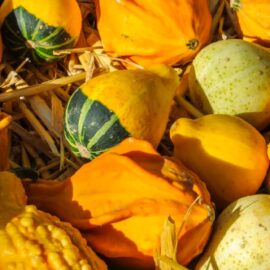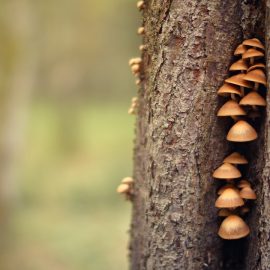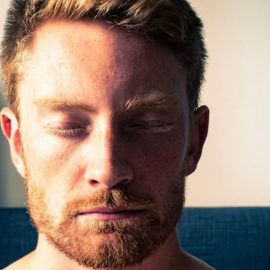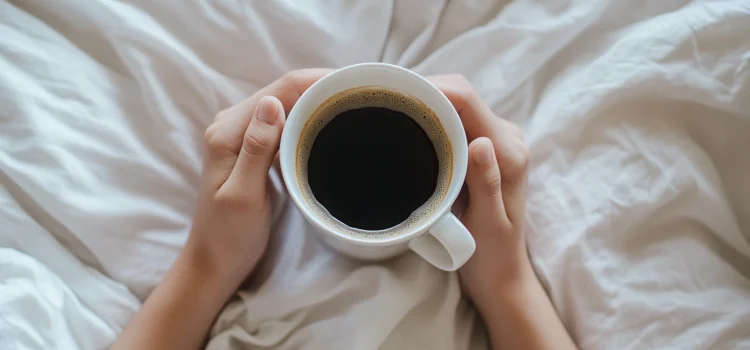
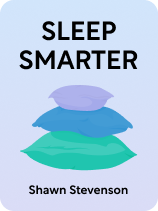
This article is an excerpt from the Shortform book guide to "Sleep Smarter" by Shawn Stevenson. Shortform has the world's best summaries and analyses of books you should be reading.
Like this article? Sign up for a free trial here.
What types of food and drinks are bad for sleep? Can you take herbal supplements to improve your sleep?
In Sleep Smarter, Shawn Stevenson discusses how your dietary choices impact your sleep patterns and quality. Certain foods and drinks can either help to promote a restful sleep or disrupt it.
Check out the drinks and foods that affect sleep, positively or negatively.
Caffeine
Stevenson names caffeinated beverages as one of the main foods that affect sleep badly. While consuming caffeine isn’t inherently bad, doing so too close to bedtime—typically, within six hours of it—can interfere with your ability to fall asleep. To fully understand why caffeine is so disruptive, we need to first consider a chemical called adenosine. Your brain naturally produces adenosine when you’re awake, and your nervous system regularly measures the amount of adenosine in your body to determine whether you’ve been awake for too long. The more adenosine your nervous system finds, the more tired it will make you feel.
Caffeine disrupts this cycle because it has a similar molecular shape to adenosine. It therefore connects with your body’s adenosine receptors and blocks adenosine from triggering them. Therefore, your central nervous system “misreads” how tired you are, believing that you’ve been awake for less time than you actually have. This prevents you from naturally falling asleep when you’re tired.
This creates a damaging cycle: Caffeine stimulates your nervous system and prevents the onset of natural sleepiness. After not sleeping well, you wake up tired, and you need to consume more caffeine to feel awake. Then, the high amount of caffeine you consume continues to disrupt your sleep, starting the loop over again.
(Shortform note: Despite its disruptive effects, caffeine consumption remains widespread. In the US, 93% of adults occasionally consume caffeine, while 75% consume it at least once a day. Furthermore, studies have found that most US adults don’t realize how much caffeine is in their beverages, and don’t know how much is safe to consume. While rare, some people have died from caffeine overdose, with children and those with pre-existing health conditions being the most vulnerable populations.)
Alcohol
Alcohol is another beverage to avoid before bedtime. Stevenson asserts that though alcohol may help you fall asleep faster, it hinders your ability to experience REM sleep. REM sleep is the stage in your nightly sleep cycle when you dream, and it’s a vital part of memory processing in your brain. Your brain needs REM sleep to prepare short-term memories for long-term storage. Without it, your memory and overall health will decline.
Additionally, alcohol can disrupt your sleep by increasing your need to urinate. Each time you get up to visit the bathroom, it breaks up your normal sleep cycle. The alcohol in your system then makes it unlikely you’ll get back into the right stage of sleep. To avoid alcohol-related sleep problems, Stevenson recommends stopping your consumption of alcoholic drinks at least three hours before you plan to go to sleep.
(Shortform note: While consuming even a moderate amount of alcohol can disrupt your sleep, heavy use of alcohol can lead to lasting sleep disruptions. One study found that chronic alcoholics can continue to have fractured sleep patterns for up to 21 months after getting sober. In other words, a lifestyle of alcoholism has the potential to keep disrupting your sleep for almost two years after putting down the bottle.)
Nutrients That Improve Sleep
Stevenson writes that a healthy diet can improve your sleep. He recommends getting nutrients from your diet rather than from supplements because your body can more easily recognize nutrients from whole foods. When vitamins and minerals are isolated in supplement form, they’re harder for your body to absorb.
(Shortform note: Some health experts provide additional reasons to prioritize healthy foods over supplements. Nutrients in food are often accompanied by additional nutrients such as carotenoids, flavonoids, and minerals that may not be found in supplements. Also, supplements are often less regulated than medicine and may contain other additives. Finally, many nutritional supplements are expensive, so simply choosing a healthier diet might be better for your financial health as well.)
Three nutrients in particular that Stevenson advises you include in your diet are tryptophan, vitamin C, and Omega-3s:
Tryptophan is necessary for serotonin production. You can get it from foods such as turkey, eggs, and sweet potatoes.
Vitamin C is important for staying asleep through the night. People who are deficient in vitamin C tend to wake up more throughout the night and generally have more sleep problems. You can get vitamin C from foods such as citrus fruits and leafy green vegetables.
Omega-3s contribute to sleep that is deeper and more restful. You can get omega-3s from foods such as salmon, chia seeds, and flax seeds.
| Additional Benefits and Sources Each of these substances has additional health benefits and dietary sources beyond those Stevenson lists. For example: Research has found that tryptophan plays a positive role in improving mood and cognition, and can help people who have inflammation-related health problems. It can be found in cheese, fish, milk, soybeans, and peanuts. Health experts assert that vitamin C supports your immune system and long-term cardiovascular health. It helps in maintaining healthy skin, blood vessels, bones, and cartilage, and helps with healing wounds. You can find it in broccoli and Brussels sprouts. Omega-3 plays a role in fetal development, cardiovascular health, and the prevention of Alzheimer’s disease. You can find it in most fatty cold water fish, like mackerel and sea bass, as well as in kidney beans, edamame, and walnuts. |
Herbal Supplements for Better Sleep
When you need a little extra help getting to sleep (and staying asleep), there are several herbal supplements that might help you. Stevenson states you shouldn’t rely solely on supplements for sleep improvement, but certain ones can support and enhance the quality of sleep when used alongside other healthy lifestyle adjustments.
Kava kava is a plant from Fiji that’s typically taken as a tea. It’s a natural sedative and helps stop fatigue and sleeplessness. Research suggests that it may reduce the amount of time needed to fall asleep and improve the quality of sleep.
Chamomile is a common herbal remedy with many uses, including as a mild sedative. Drinking a cup of chamomile tea at night can help you fall asleep by relaxing your nervous system and releasing muscle tension.
Valerian is a stronger sedative. It helps you to fall and stay asleep. Its medicinal benefits come from the root, and it can be taken in tea, tincture, or capsule form.
| Health Risks and Side Effects Even herbal remedies, such as the ones Stevenson mentions, can have side effects and health risks: Kava kava is traditionally a ceremonial plant used throughout the Pacific. However, research suggests it may be toxic to the liver, and it’s regulated in many countries, including Australia, Canada, Germany, Poland, and the UK. Furthermore, some researchers contend it has become a drug of abuse among Indigenous Australians, with destructive effects on their communities. If you use kava kava as a sleep aid, educate yourself on its effects and its legal status in your country. Chamomile is generally considered a safe sleep aid. However, in rare instances, users may experience allergic reactions, particularly if they’re allergic to related plants like ragweed, chrysanthemums, or daisies. Chamomile may also interact with certain drugs like cyclosporine and warfarin, so talk to your health care provider if you are taking medication. Valerian is widely considered safe, and relatively few side effects have been documented. However, research has linked Valerian to liver damage at high doses. One case study also suggests that frequent use could lead to withdrawal symptoms, including delirium. Use with caution. |

———End of Preview———
Like what you just read? Read the rest of the world's best book summary and analysis of Shawn Stevenson's "Sleep Smarter" at Shortform.
Here's what you'll find in our full Sleep Smarter summary:
- How sleep affects your body, mind, and overall quality of life
- Practical suggestions for achieving a good night’s sleep
- The unexpected benefits of eating sweet potatoes

